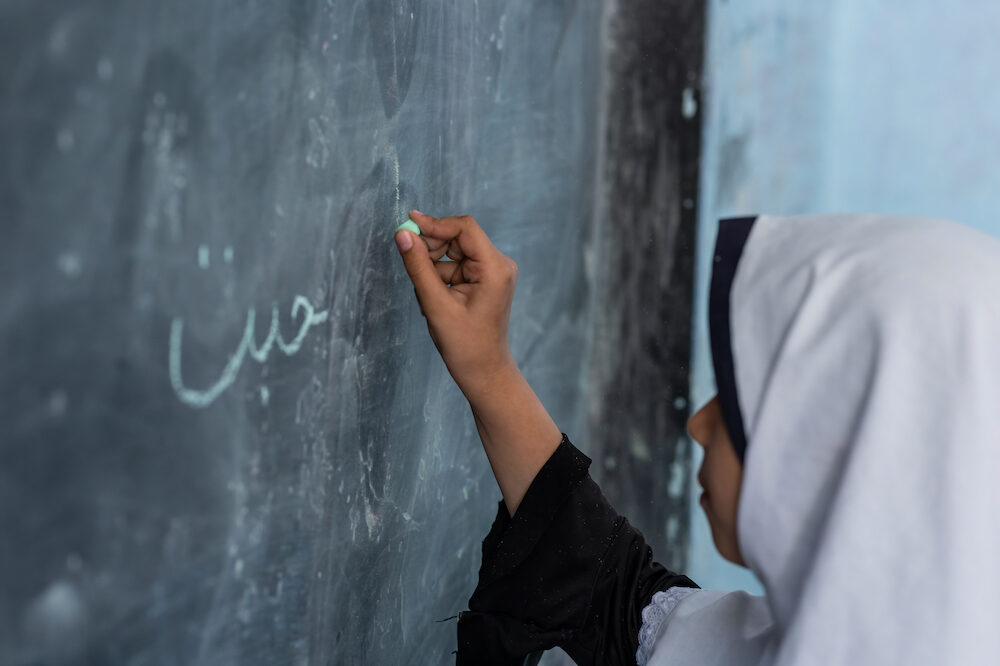Five things you need to know this week about global education

Our roundup looks at emergency cash help for Afghan teachers and a robot that stands in for a boy whose medical condition means he can't go to school.
EU to boost education in Afghanistan
The European Union has launched projects worth $90 million to support the education of millions of children caught up in Afghanistan’s humanitarian crisis.
Emergency cash support for 194,000 public school teachers during the winter will benefit almost nine million students aged six to 18. The project will be run by UNICEF.
A second programme implemented by the World Food Programme will provide school meals and take-home food for primary school children. The EU will also support cash transfers for the families of secondary-age girls who are attending school.
The projects are part of a $300 million EU package helping to maintain education, sustain livelihoods and protect public health in Afghanistan, including for refugees and internally displaced people. Jutta Urpilainen, EU Commissioner for International Partnerships, said: “We will not abandon the Afghan people.”
‘No need now’ to shut schools
There is no reason now to keep schools closed because of Covid-19 – even if there are new waves, according to the World Bank’s Education Director.
Jaime Saavedra – whose team has tracked the impact of school shutdowns during the pandemic – said there is no evidence that reopening schools has caused a surge in cases or that schools are not safe places for children.
Saavedra told the Press Trust of India: “There is no relation between opening schools and the spread of coronavirus. Even if there are new waves of Covid-19, closing schools should be the last resort.”
On the issue of vaccinating children, he said: “There is no country which has put the condition of reopening schools only after children are vaccinated. Because there is no science behind it and it does not make sense from public policy perspective.”
Robot stands in for sick student
Joshua Martinangeli, 7, interacts with his class through an avatar robot that sits in school in his place and sends a blinking signal when he has something to say https://t.co/q6DDpXXlZX pic.twitter.com/YaW6mtBdvy
— Reuters (@Reuters) January 15, 2022
Seven-year-old Joshua Martinangeli is too ill to go to school because of a severe lung disease. But the German student can still interact with his teacher and classmates from home through an avatar robot that sits in class and sends a blinking signal when he has something to say.
“The children talk to him, laugh with him and sometimes even chitchat with him during the lesson. Joshi can do that quite well too,” said Ute Winterberg, head teacher at his Berlin school.
The project is funded by the local council, which has bought four avatars for its schools.
Councillor Torsten Kuehne said: “The impetus was Covid-19 but I think this will be the future well beyond the pandemic. It does happen from time to time that a child cannot go to class in person. Then the avatar can give that child a chance to remain part of the school community.”
Help at hand for Tonga’s schools
It could be days or even weeks before the full devastation caused by the volcano and tsunami in Tonga becomes clear.
But already UN agencies and humanitarian organisations are looking at how to provide emergency education as well as food, shelter and security. At least 28,000 children on the South Pacific islands are thought to have been affected in some way.
Shairana Ali, CEO of Save the Children Fiji, said: “Children in Tonga were due to return to school on January 31 but the damage and destruction to schools will undoubtably delay the resumption of learning.” Save the Children already supports a distance learning programme to reach outlying islands.
In 2018, Tropical Cyclone Gita damaged 109 of Tonga’s 150 schools. A major programme had rebuilt and repaired schools to make them more resilient to extreme weather.
Jordan schools ‘must reopen and stay open’
Three United Nations agencies have called for schools in Jordan to reopen quickly – and stay open – after the start of the new term was delayed because of rising Covid cases.
More than two million students were due to return on February 1 but that has now been extended until February 20.
The heads of UNESCO, UNICEF and WHO in Jordan said schools should be the last sector to close and the first to open to prevent a loss of learning that could impact children for years.
UNICEF Representative Tanya Chapuisat said: “Time is of the essence to help children who have already lost almost two years of in-person learning. The focus must be on getting the most vulnerable children who are facing a shadow pandemic of child labour, early marriage and mental health issues, and are most at risk of dropping out, back to school.”